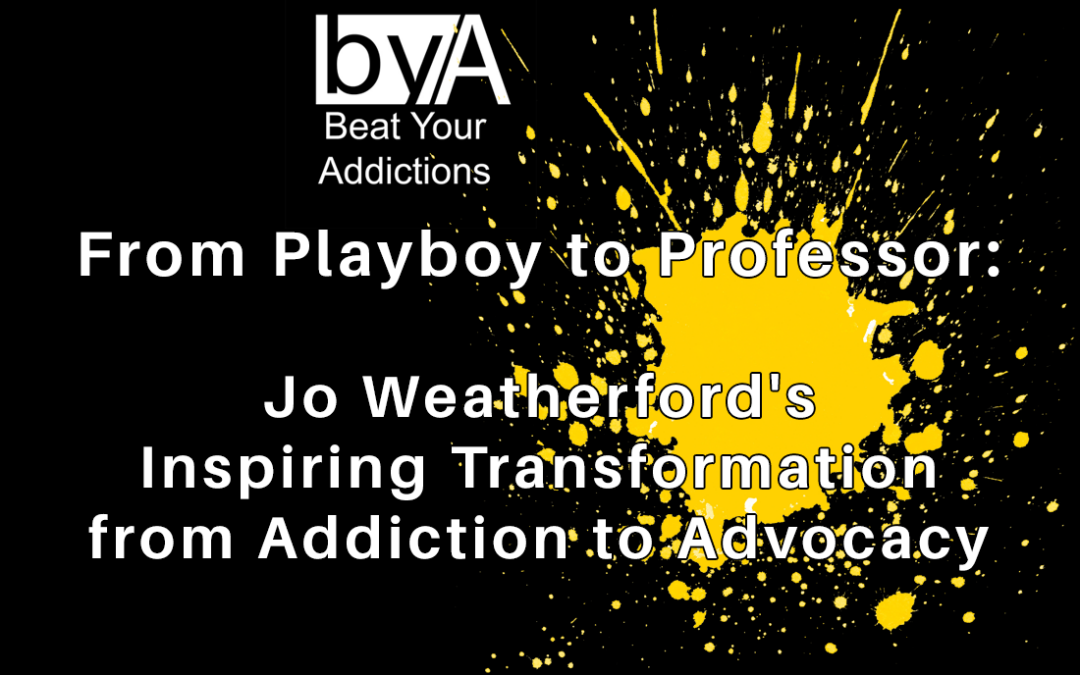In this classic episode of the “Beat Your Addictions podcast“, host John Giordano and co-host Scott Jones engage in a candid conversation with Jo Weatherford, a prominent addiction specialist and coach. The discussion centers on the multifaceted nature of addiction and recovery, highlighting both traditional and alternative approaches to treatment. Jo shares her personal journey, combating addiction for 12 years, and emphasizes the significance of spiritual and holistic practices alongside traditional therapy. The hosts also delve into the challenges faced by individuals in recovery, the flaws within existing treatment models, and the societal misconceptions around addiction.
The episode “From Playboy to Professor: Jo Weatherford’s Inspiring Transformation from Addiction to Advocacy” underlines the importance of compassionate curiosity in exploring one’s inner workings, actualizing the realization that overcoming addiction is not just about abstaining from substances, but about holistic healing and personal growth. This podcast segment serves as a clarion call for more comprehensive and safe approaches to addiction treatment, urging listeners to be proactive in their healing journeys and emphasizing that recovery is a lifelong commitment.
Highlights
- 🎙️ Jo Weatherford’s insights into alternative treatment methods for addiction.
- 🌱 The discussion on holistic healthcare approaches, including micronutrient testing, yoga, and more.
- 🌍 The global nature of recovery, with guests joining from abroad to share diverse perspectives.
- 🌌 Jo’s transformative experience with psychedelics and its impact on her recovery journey.
- 💬 The significance of pre- and post-integration therapy in the healing process.
- 🛑 Critique of mainstream treatment models and their limitations in addressing addiction comprehensively.
- 💖 The episode emphasizes self-love and compassionate curiosity as essential elements in the recovery journey.
Key Insights
- 🌿 Holistic Healing Matters: Traditional treatment often overlooks the importance of addressing underlying physical health issues that contribute to addiction. Incorporating nutritional assessments, exercise, and alternative therapies can create a well-rounded approach to recovery.
- 💡 Integration of Psychedelics: Jo Weatherford emphasizes the potential benefits of psychedelics in therapeutic settings, suggesting they can assist individuals in confronting the root causes of their addictions. However, she stresses the need for safe protocols and proper integration therapy post-experience.
- ✨ Personal Responsibility in Recovery: Both Jo and John agree on the necessity of taking personal ownership of one’s recovery journey, moving beyond just abstaining from substances to embracing comprehensive self-care practices.
- 🛡️ Safety First: Jo raises concerns about the safety of psychedelic treatments, underscoring that without adequate pre-screening and post-treatment support, individuals may not fully benefit from such experiences.
- 🙏 Compassionate Curiosity: The framework of compassionate curiosity towards one’s addiction fosters a deeper understanding of internal motivations and behaviors, enabling more effective healing than conventional approaches that often utilize shame.
- 🎓 Continued Learning: Jo emphasizes that recovery is not a finite process but involves continuous education and personal growth. Therapists should also remain humble and willing to learn from their clients.
- 💔 Societal Impact of Addiction: Personal anecdotes of tragic losses connected to addiction spotlight the urgent need for effective treatment models. Jo mentions the rise of new substances and the importance of adapting treatment strategies to meet evolving challenges in addiction.
Conclusion
This podcast episode is a poignant reminder of the complexities surrounding addiction and recovery and the necessity for an empathetic, well-rounded approach. Listeners are encouraged to engage with various recovery methods, recognize the importance of mental and physical health, and remain open to learning and personal growth throughout their healing journey. The discussion opens avenues for new narratives about addiction and recovery, calling for transformation in not just individual lives but also in societal perceptions and treatment practices. Anticipated change becomes achievable through unified efforts to address these multifaceted challenges, ultimately inspiring hope and healing in those affected by addiction.


Recent Comments